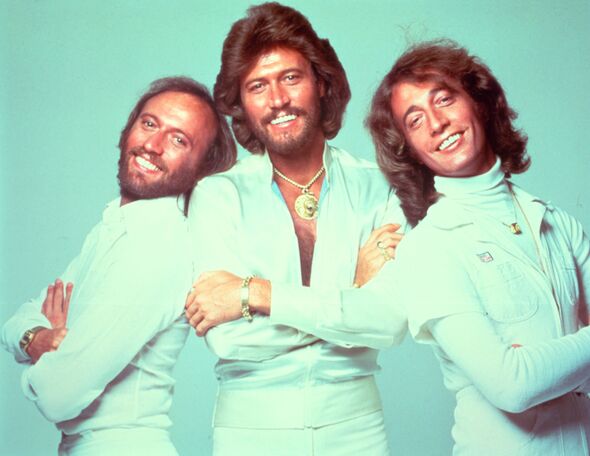Entertainment
Bee Gees Dismiss Longtime Collaborators in Controversial Move

The Bee Gees, one of the most successful musical acts of the 1970s, made headlines recently due to their decision to dismiss long-term collaborators Dennis Bryon and Blue Weaver, as well as guitarist Alan Kendall. This decision, delivered over the phone, marked a significant shift in the band’s dynamics as they sought to redefine their sound amidst changing musical trends.
During their peak years, the Bee Gees, comprising brothers Barry, Robin, and Maurice Gibb, dominated the charts with iconic hits such as “Stayin’ Alive” and “Night Fever.” However, despite their songwriting prowess, the trio relied heavily on skilled session musicians to bring their music to life. Surprisingly, many of these talented musicians hailed not from traditional music hubs like Los Angeles or New York, but from Cardiff, Wales.
Two of the most notable contributors were Dennis Bryon, a drummer and percussionist, and Blue Weaver, a keyboardist. Both had previously gained fame with the 1960s band Amen Corner. Their work on the Bee Gees’ albums helped shape the distinctive sound that captured the hearts of millions. The rhythmic patterns in “Stayin’ Alive” can be attributed to Bryon, while Weaver’s keyboard contributions were essential to tracks like “How Deep Is Your Love.”
As the Bee Gees transitioned from their 1960s roots to disco icons, they faced a challenging period in the early 1970s. After a series of lackluster performances, the brothers realized they needed to revitalize their music. A pivotal moment came when Barry discovered his talent for singing in falsetto, which opened doors to new creative possibilities. Along with the addition of Kendall on guitar, the group began crafting a new sound that would lead to their remarkable comeback.
Their collaboration produced an impressive run of hits from 1975 to 1980, including the groundbreaking soundtrack for the film Saturday Night Fever. Bryon and Weaver played instrumental roles in this success, with Weaver even earning songwriting credits for his contributions to “Night Fever.” As Bryon recounted, he had to adapt quickly to the demands of the recording industry, which often required innovative solutions to challenges, such as splicing his drumming from one track into another to complete “Stayin’ Alive.”
Despite their success, the Bee Gees faced inevitable changes as musical tastes shifted in the late 1970s. Disco’s declining popularity prompted the brothers to make difficult decisions regarding their lineup. In 1980, they decided to part ways with Bryon and Weaver, as well as Kendall, in a bid to maintain their relevance in a rapidly evolving music scene. The decision to inform them over the phone rather than in person was met with disappointment and frustration, particularly from Weaver, who considered legal action.
In the aftermath of the dismissals, Barry Gibb acknowledged that he mishandled the situation and offered to compensate Bryon and Weaver from future earnings. According to Bee Gees biographer Bob Stanley, a reconciliation followed shortly after, allowing the former collaborators to remain on cordial terms, though they would never work together again.
Following their departure from the Bee Gees, both Bryon and Weaver continued to have successful careers in the music industry. Bryon moved to Nashville, Tennessee, where he passed away in November 2024 at the age of 75. Weaver, still active in music, now resides in Germany and has been performing in “Massachusetts: The Bee Gees Musical,” a production that celebrates the band’s storied history.
Reflecting on their time with the Bee Gees, Allan Jones, a former bandmate, noted the impressive accomplishments of Bryon and Weaver. “They made some money out of it, which is important as a jobbing musician,” he remarked. Their contributions to the Bee Gees’ legacy, particularly during a time when they sold more records than any other band since the Beatles, remain significant.
The story of the Bee Gees is one filled with highs and lows, underscoring the complexities of the music industry and the importance of collaboration. As fans continue to celebrate their timeless hits, the impact of Bryon and Weaver’s contributions will not be forgotten.
-

 Health3 months ago
Health3 months agoNeurologist Warns Excessive Use of Supplements Can Harm Brain
-

 Health3 months ago
Health3 months agoFiona Phillips’ Husband Shares Heartfelt Update on Her Alzheimer’s Journey
-

 Science1 month ago
Science1 month agoBrian Cox Addresses Claims of Alien Probe in 3I/ATLAS Discovery
-

 Science1 month ago
Science1 month agoNASA Investigates Unusual Comet 3I/ATLAS; New Findings Emerge
-

 Science4 weeks ago
Science4 weeks agoScientists Examine 3I/ATLAS: Alien Artifact or Cosmic Oddity?
-

 Entertainment4 months ago
Entertainment4 months agoKerry Katona Discusses Future Baby Plans and Brian McFadden’s Wedding
-

 Science4 weeks ago
Science4 weeks agoNASA Investigates Speedy Object 3I/ATLAS, Sparking Speculation
-

 Entertainment4 months ago
Entertainment4 months agoEmmerdale Faces Tension as Dylan and April’s Lives Hang in the Balance
-

 World3 months ago
World3 months agoCole Palmer’s Cryptic Message to Kobbie Mainoo Following Loan Talks
-

 Science4 weeks ago
Science4 weeks agoNASA Scientists Explore Origins of 3I/ATLAS, a Fast-Moving Visitor
-

 Entertainment4 months ago
Entertainment4 months agoLove Island Star Toni Laite’s Mother Expresses Disappointment Over Coupling Decision
-

 Entertainment3 months ago
Entertainment3 months agoMajor Cast Changes at Coronation Street: Exits and Returns in 2025









